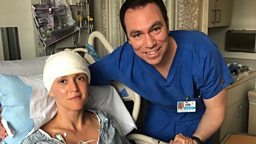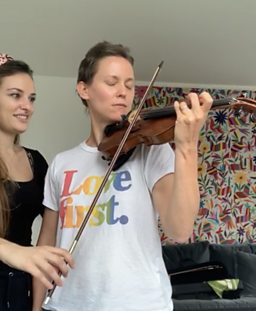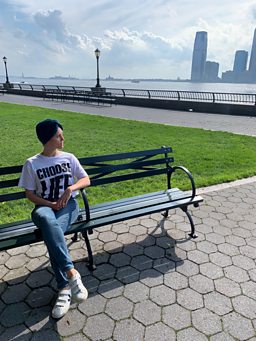The sun will shine again: how music is helping Clemency heal
15 August 2020

Foreword from Alan Davey, Controller Βι¶ΉΤΌΕΔ Radio 3 and Βι¶ΉΤΌΕΔ Classical Music
Some of you may have noticed, amongst all the Βι¶ΉΤΌΕΔ cultural programming and presenters doing their thing this year, during lockdown and outside of it, one voice has been much missed; and that's our colleague, friend, and presenter of Radio 3's Classical Fix, Clemency Burton-Hill.
I'm sorry to tell you that this is because in January she suffered a serious brain haemorrhage. This happened in New York, where she moved in September 2018 to take up the role of Creative Director at WQXR, the New York public radio classical music station. Since she became unwell, she has been recovering with the help of her family and friends. She is much missed by all of us at the network and also across the Βι¶ΉΤΌΕΔ. I know she misses you all too.
Everyone who knows Clemmie knows how passionate she is about sharing music and getting as many people as possible to discover the wonders of classical, and so it will be no surprise to you that music has played a vital part in her recovery.
In the article below, written by journalist Sophie Elmhirst, one of Clemmie's oldest friends, Clemmie talks about what she has been through over the last seven months and the role of music in that time. I hand you over to Clemmie and Sophie to share her story with you.
By Sophie Elmhirst
In January this year, an hour or two before she collapsed from a brain haemorrhage, Clemency Burton-Hill was on the subway in New York, listening to a new recording of the pianist Vikingur Ólafsson playing a piece by the composer Jean-Philippe Rameau.
Clemmie – presenter of Radio 3’s award-winning Classical Fix programme and a long-running presenter on Βι¶ΉΤΌΕΔ Arts and Βι¶ΉΤΌΕΔ Classical projects including Βι¶ΉΤΌΕΔ Young Musician, the Βι¶ΉΤΌΕΔ Proms, the Culture Show, Radio 4’s Tales from the Stave, Hay Festival debates and documentaries – is currently creative director of New York Public Radio's classical station . That morning she was on her way to a new space in Brooklyn where she was planning to host a series of intimate concerts and conversations. Ólafsson was to be the first guest. She can remember now that as she listened, she marvelled for the thousandth time at the ability of music to cross time and space, so that a young, contemporary Icelandic pianist could commune with an 18th-century Frenchman across generations. “It’s still so moving to me,” she says, “how in Ólafsson’s hands the music could sound completely new, different, revelatory.”
At the meeting, Clemmie was suddenly unable to talk. She collapsed, was rushed to the nearest hospital in Brooklyn, then transferred to Mount Sinai West hospital in Manhattan, where neurosurgeon Dr Christopher Kellner removed half her skull and performed emergency brain surgery. She had suffered a massive haemorrhage caused by a previously undiagnosed condition: an arteriovenous malformation (AVM), an uncommon and abnormal cluster of blood vessels meshing the arteries and veins in her brain. In the extremely rare case of an AVM rupture, it can be fatal. Clemmie’s life was saved, but in the early days post-surgery it was uncertain how much of her brain would recover.
For the following 17 days during which Clemmie was unconscious, music was played on a small speaker by her bed, all day and all night. The playlist was compiled by her family and friends – a lot of Bach, plenty of jazz, renaissance polyphony, funk – a mix reflecting her omnivorous tastes. One friend, the British opera singer Andrew Staples, was performing in New York when she collapsed and spent many days in hospital by her side.

Before she showed any sign of consciousness, he recalls her left foot tapping along to some Brahms. “I forget what exactly,” said Staples. “But I remember it struck me as a non-typical piece to inspire toe-tapping.” A week or so later, just after the doctors had removed the tubes that had helped her to breathe, one of her favourite pieces of music, Richard Strauss’s Morgen, happened to play through the speaker. Clemmie, who has played the violin all her life, had performed the song at the Hay Festival with Staples years ago. “With her good hand she grabbed my wrist as I leant over her shaven head, and I sang the words to her,” recalls Staples. “The opening of the poem goes ‘And tomorrow the sun will shine again...’ We both cried a lot. I wasn’t worried from then on about whether she was ‘in there’ anymore.”
Music is the opposite of despair: it was going to be worth the fight
Clemmie can’t remember that moment, but she does remember how music, in her earliest periods of wakefulness when she could still neither move or talk, was far more than comfort or distraction. It gave her hope. Just before she regained consciousness, she recalls how she seemed to make a choice of whether to give up or to live. She chose life, however hard it was going to be, and music was her lifeline. “It was literally: I can do this, I’m going to get through this,” she says now. “Music is the opposite of despair. It was going to be worth the fight.”
In the subsequent weeks, as she has begun the long and arduous process of re-learning to speak and walk, and undergoing physical therapy to strengthen the right side of her body which was affected by the bleed, music has kept her going. “It is the ultimate motivation,” she says. At times, though, it has almost been too poignant, like when she found herself devastated by a recording of Bach’s Concerto for Two Violins, a piece she has always loved to play. “Sometimes it is too hard to listen,” she explains. (She has to choose her tracks carefully: a dose of Taylor Swift or Burna Boy can easily lift her again).
There have been little miracles, too, as when her friend, the violinist Nicola Benedetti, came to visit, and they realised that with Clemmie playing the left hand on the violin and Benedetti bowing, they could play one of the parts of the Bach Concerto together. The notes were all still there in her fingers, her memory of the music entirely intact. “It’s a clichéd idea that music is beyond language,” says Clemmie, “but from what I’ve experienced in my own brain, I truly know that now.”
In her career, the two – music and language – have always been interwoven. Clemmie has written as much as she’s broadcast. She has introduced music to a wider audience through her podcasts, like Βι¶ΉΤΌΕΔ Radio 3’s Classical Fix and from WNYC Studios, or her television documentaries about Stradivarius and the violinist and teacher .
Her mission, exemplified in her latest book Year of Wonder: Classical Music for Every Day, has always been to demystify and democratise classical music, to prove that it is accessible to anyone with an open mind and heart. But her writing has also covered numerous other subjects, including technology and artificial intelligence which – by coincidence – her brain surgeon believes to be potentially transformative for future treatment of brain conditions such as hers.

So far, Clemmie’s recovery has been remarkable, her language and movement starting to return despite the coronavirus pandemic meaning that most of her rehabilitation has to happen virtually, rather than in person. “I really believe music is a part of my recovery because it uses both sides of the brain,” she says. “It’s as though it trains your brain to be ambidextrous.”
She has always been fascinated by the relationship between music and the mind, but now, being a living example of its ability to heal and to communicate when there are no words, she is ever more convinced of its power to connect people to each other, and to help a brain rewire and recover. “Sometimes it is the thing that gives me solace,” she says. “And sometimes it’s the thing that helps me to get up, and fight, and to live.”

